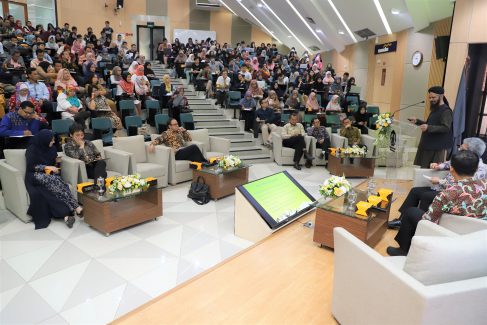Islamic Economics, a New Engine of Strong, Sustainable and Inclusive Economic Growth
Nino Eka Putra ~ Humas FEB UI
DEPOK – Islamic Economics FEB UI in collaboration with ISEF (Indonesia Sharia Economic Festival) under the auspices of Bank Indonesia held the ISEF 6th International Public Seminar “Embracing Sharia Economy as A New Engine Towards Strong, Sustainable, and Inclusive Growth” which took place in the Soeria Auditorium Atmadja, Gedung Dean, on Thursday (11/14/2019).

This activity was opened by remarks from the Chair of the Department of Economics FEB UI, Teguh Dartanto, we must improve the future of educational institutions to print and provide human resources excellence. A very important aspect is also for the development of the Islamic financial industry. In line with this, FEB UI also strives to provide excellent high-quality education and research, in accordance with its vision to be the center of economic & business learning in Asia. Finally, I would like to express my sincere thanks and appreciation to all those who have supported this event. Hopefully this seminar has an interesting session and can enrich your knowledge.
Then, remarks from the sponsors of Bank Indonesia, Reza Anglingkusumo as Director of the Bank Indonesia Institute, that the message from the Vice President of the Republic of Indonesia, Ma’ruf Amin in opening the ISEF 2019, in developing the Islamic economy there were 4 aspects that wanted to be focused namely the halal industry, encouraging the industry Islamic finance, Islamic social funds, and halal business.

With Indonesia’s majority Muslim population, the Islamic economy is also expected to be able to develop Indonesia’s economy. On that basis, Ma’ruf stressed that he and President Joko Widodo will lead directly the development of Islamic economic institutions. The strategies used by accelerating the development of Islamic economics, expanding and advancing Islamic economics in order to strengthen national economic resilience.
Asad Zaman from the International Islamic University of Pakistan, explained that Islamic economics was largely taken from western literature and modified it to combine Islamic perspectives. This leads to the widespread belief that Islamic economics is a variant or branch of conventional economics. The conventional view is that Islamic economics must be a compromise between Islamic ideals embodied in homo islamicus, and realistic views contained in homo economicus.

Islamic economics is a social science in which learning about the economic problems of a community based on Islam and based on four knowledge namely the Qur’an, sunnah, ijmak, and qiyas. Therefore, the community will be controlled how to meet their needs and use them in accordance with Islamic teachings.
At present, the new direction of the Islamic economy is transforming greatly on the public market. One of the ways to make it happen is the world of education that is designed to turn us into superior and high-quality human resources. The knowledge we have about the world is formed by a strong interest.
“So, there are 5 objectives of learning Islamic economics, namely discussing the purpose of life to serve selflessly to get love from God. Second, teach the true sources of happiness. Third, develop the potential for excellence that a person has the potential to change the world. Fourth, restore confidence that Islamic economics can rise and compete with conventional economics. And finally, personalized development, because Islamic economics teaches cooperation, generosity, social responsibility, community, and service, “said Asad Zaman.

Dadang Muljawan as Director for the Department of Islamic Economics and Finance of Bank Indonesia gave a view that the sharia economy if implemented in the form of policies could make the national economic growth stronger and more sustainable. Of course, the policy taken must be with good planning and requires careful calculation to be right on target. In addition, we try to value our lives by optimizing and relating to al-maqasid shariah. Thus, social mechanisms to achieve Islamic economic policy and corporate governance are achieved perfectly. (Des)




























